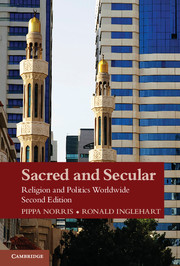Book contents
- Frontmatter
- Contents
- Tables
- Figures
- Preface and Acknowledgments
- Part I Understanding Secularization
- Part II Case Studies of Religion and Politics
- Part III The Consequences of Secularization
- 7 Religion, the Protestant Ethic, and Moral Values
- 8 Religious Organizations and Social Capital
- 9 Religious Parties and Electoral Behavior
- Conclusions
- Appendix A
- Appendix B
- Appendix C
- Notes
- Bibliography
- Index
8 - Religious Organizations and Social Capital
from Part III - The Consequences of Secularization
Published online by Cambridge University Press: 05 June 2012
- Frontmatter
- Contents
- Tables
- Figures
- Preface and Acknowledgments
- Part I Understanding Secularization
- Part II Case Studies of Religion and Politics
- Part III The Consequences of Secularization
- 7 Religion, the Protestant Ethic, and Moral Values
- 8 Religious Organizations and Social Capital
- 9 Religious Parties and Electoral Behavior
- Conclusions
- Appendix A
- Appendix B
- Appendix C
- Notes
- Bibliography
- Index
Summary
earlier chapters have demonstrated that where religious values are undermined by the first stage of the modernization process, this influences participation in services of worship. What are the broader consequences of secularization for engagement in faith-based organizations, civic networks, and social capital in postindustrial societies? Mainline Protestant churches in the United States – Methodists, Presbyterians, Episcopalians, and Lutherans – have long been regarded as playing a central role in the lives of their local communities. They are believed to do so by providing places for people to meet, fostering informal social networks of friends and neighbors, developing leadership skills in religious organizations and church committees, informing people about public affairs, delivering welfare services, providing a community meeting place, drawing together people from diverse social and ethnic backgrounds, and encouraging active involvement in associational groups concerned with education, youth development, and human services, exemplified by the Rotary clubs, YMCA, and school boards.
The role of churches in the United States raises important questions: in particular, do religious institutions function in similar ways in other countries, fostering social networks, associational activism, and civic engagement? And, if so, has secularization contributed to an erosion of social capital in postindustrial societies? To focus on these issues, the first section of this chapter outlines Robert Putnam's influential theory about the role of religion in social capital. We then analyze the extent to which religious participation seems to affect belonging to voluntary organizations and community associations, both faith-based and non-religious, in different faiths and types of society. The last section considers the effects of religious participation on a broader range of civic attitudes and behaviors.
- Type
- Chapter
- Information
- Sacred and SecularReligion and Politics Worldwide, pp. 180 - 195Publisher: Cambridge University PressPrint publication year: 2011
- 1
- Cited by



